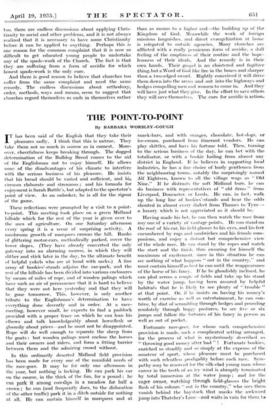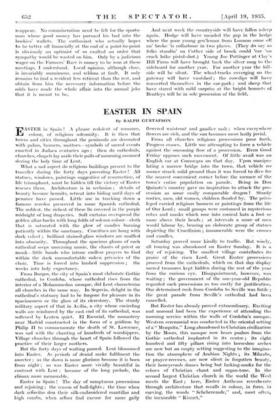THE POINT-TO-POINT
By BARBARA WORSLEY-GOUGH
IT has been said of the English that they take their pleasures sadly. I think that this is untrue. They take them not so much in sorrow as in earnest. More- over, cheerfulness keeps breaking through. The dogged determination of the Bulldog Breed comes to the aid of the Englishman out to enjoy himself. He allows none of the disadvantages of his climate to interfere with the serious business of his pleasure. He insists that his bread should be varied and sufficient, and his circuses elaborate and strenuous ; and his formula for enjoyment is Sarah Battle's, but adapted to the spectator's point of view. As an onlooker, he is all for the rigour of the game. • These reflections were prompted by a visit to a point- to-point. This meeting took place on a green Midland hillside which for the rest of the year is given over to the uses of agriculture. On one Saturday afternoon every spring it is a scene of surprising activity. A mushroom growth of marquees crowns the hill. Ranks of glittering motor-cars, methodically parked, cover the lower slopes. (They have already converted the only gateway into an alarming morass, in which they will slither and stick later in the day, to the ultimate benefit of helpful yokels who are at hand with sacks.) A fine array of bookies'-stands adjoins the car-park, and the rest of the hillside has been divided into various enclosures by means of miles of rope, and of wooden palings which have such an air of permanence that it is hard to believe that they were not here yesterday and that they will be gone tomorrow. This, however, is only another tribute to the Englishman's determination to have everything done decently and in order. At a race- meeting, however small, he expects to find a paddock provided with a proper fence on which he can lean his elbows and talk knowledgeably about horseflesh or gloomily about prices—and he must not be disappointed. Rope will do well enough to separate the sheep from the goats : but wooden palings must enclose the horses and their owners and riders, and form a fitting barrier between them and the admiring crowd without.
In this ordinarily deserted Midland field provision has been made for every one of the manifold needs of the race-goer. It may be for only one afternoon in the year, but nothing is lacking. He can park his car on the course, in the thick of the fun, for a pound ; he can park it among cowslips in a meadow for half a crown ; he can (and frequently does, to the dislocation of the other traffic) park it in a ditch outside for nothing at all. lie can sustain himself in marquees and at snack-bars, and with oranges, chocolate, hot-dogs, or ice-cream, purchased from itinerant vendors. He can play skittles, and have his fortune told. Then, turning to the serious business of the day, he can bet with the. totalisator, or with a bookie hailing from almost any district in England. If he believes in supporting local industries, he has a fine choice of burly gentlemen from the neighbouring towns, notably the surprisingly named All Eighteen, known to all the village wags as " Old Nine." If he distrusts the soft Midland burr, he can do business with representatives of " old firms " from Liverpool, Doncaster, or Leeds. He can, in fact, walk up the long line of bookies'-stands and hear the odds shouted in almost every dialect from Thames to Tyne— a luxury. which is not appreciated as it should be.
Having made his bet, he can then watch the race from any one of a variety of vantage points. He can stand on the roof of his ear, his field-glasses to his eyes, and his feet encumbered by rugs and sandwiches and his female com- panions, and enjoy a distant but comprehensive view of the whole race. He can stand by the ropes and watch the start. and the finish. thus ensuring for himself the maximum of excitement, since in this situation he can see nothing of what happens " out in the country," and must contain himself as best he can until the reappearance of the horse of his fancy. If he be ghoulishly inclined, he can plod across a couple of fields and take up his stand by the water jump, having been assured by helpful habitues that he is likely to see plenty of " trouble " at that point. Or, if he insists on having his money's worth of exercise as well as entertainment, he can con- trive, by dint of scrambling through 'hedges and pounding resolutely through boggy pastures, to see five or six jumps and follow the fortunes of his fancy in person as well as out of pocket.
Fortunate race-goer, for whom such comprehensive provision is made, such a complicated setting arranged, for the process of what is mysteriously described as " throwing good money after bad " ! Fortunate bookies, enriched so steadily and so simply at the expense of the amateur of sport, whose pleasure must be purchased with such relentless prodigality before each race. Sym- pathy may be reserved for the silk-clad young man whose career in the teeth of an icy wind is abruptly terminated by total immersion at the water jump ; and for the eager owner, watching through field-glasses the bright flash of his colours " out in the country," who sees them vanish behind the haystack that masks the awkward jump into Thatcher's Lane—and waits in vain for them to reappear. No commiseration need be felt for the sports- man whose good money has pursued his had into the bookies' wallets. The enthusiast who actually hopes to be better off financially at the end of a point-to-point is obviously an optimist of so exalted an order that sympathy would be wasted on him. Only by a• judicious wager on the Farmers' Race is money to be won at these meetings, I understand. Local opinion, although close, is invariably unanimous, and seldom at fault. It only remains to find a resident less reticent than the rest, and obtain from him the necessary information before the odds have made the whole affair into the annual joke that it is meant to be. And next week the countryside will have fallen asleep again. Hodge will have mended the gap in the hedge where the poor young genleman from Lunnon come off an' broke 'is collarbone in two places. (They do say as folks standin' on t'other side of brook could 'car 'un crack loike pistol-shot.) Young Joe Pottinger at Clays Hill Farm will have brought back the silver mug to the sideboard for another year. For another year the hill- side will be silent. The wheel-tracks coverging on the gateway will have vanished ; the cowslips will have reasserted themselves in the car-park ; and sheep that have stared with mild surprise at the bright bonnets of Bentleys will be in sole possession of the field.







































 Previous page
Previous page